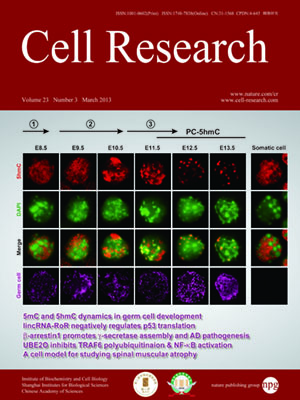
Volume 23, No 3, Mar 2013
ISSN: 1001-0602
EISSN: 1748-7838 2018
impact factor 17.848*
(Clarivate Analytics, 2019)
Volume 23 Issue 3, March 2013: 366-377
ORIGINAL ARTICLES
UBE2O negatively regulates TRAF6-mediated NF-κB activation by inhibiting TRAF6 polyubiquitination
Xiaofei Zhang1,*, Juan Zhang1,*, Long Zhang1, Hans van Dam1 and Peter ten Dijke1
1Department of Molecular Cell Biology, Cancer Genomics Centre Netherlands and Centre for Biomedical Genetics, Leiden University Medical Center, Postbus 9600, 2300 RC Leiden, The Netherlands
Correspondence: Peter ten Dijke(p.ten_dijke@lumc.nl)
Tumor necrosis factor (TNF) receptor-associated factor 6 (TRAF6) is a key regulator of the activation of transcription factor NF-κB by the interleukin-1 receptor (IL-1R)/Toll-like receptor (TLR) superfamily. Recruitment of TRAF6 to the receptor-associated IRAK1-IRAK4-MyD88 adaptor protein complex induces lysine 63 (K63) autopolyubiquitination of TRAF6, which leads to further recruitment of downstream regulators, such as TAB2/3 and TAK1, and subsequently triggers NF-κB activation. Here, we identified the putative E2 ubiquitin-conjugating (UBC) enzyme UBE2O as a novel negative regulator of TRAF6-dependent NF-κB signaling. We found that UBE2O binds to TRAF6 to inhibit its K63-polyubiquitination, and to prevent the activation of NF-κB by IL-1β and lipopolysaccharides (LPS). We further show that the inhibitory effect of UBE2O is independent of its carboxy-terminal UBC domain. In contrast, we found that UBE2O acts to disrupt the IL-1β-induced association of TRAF6 with MyD88. These results provide novel insight into the regulation of signaling by IL-1R/TLR and TRAF6.
Cell Research (2013) 23:366–377; doi:10.1038/cr.2013.21; published online 5 February 2013
FULL TEXT | PDF
Browse 2298


